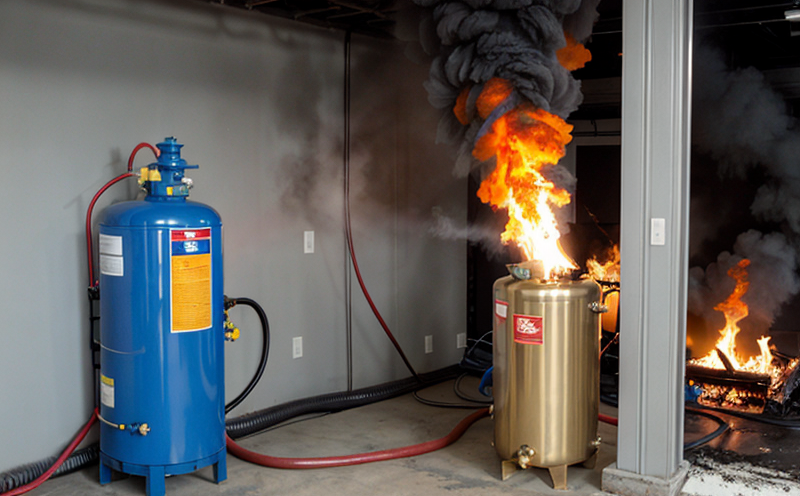Valve Functionality and Tamper Testing
In the realm of fire safety testing, valve functionality and tamper testing are paramount. Valves play a critical role in ensuring that fire suppression systems operate efficiently and reliably when called upon to protect lives and property. The integrity of these valves is non-negotiable, as any failure could lead to catastrophic consequences. This service ensures that the valves used in fire protection systems meet stringent standards for functionality and tamper resistance.
Valves are typically subjected to a series of tests designed to evaluate their ability to withstand environmental stressors, maintain pressure integrity, and resist unauthorized access or manipulation. The testing process involves a range of procedures, including static and dynamic pressure testing, endurance testing under extreme conditions, and simulation of real-world operational scenarios.
Our team at Eurolab employs advanced instrumentation and specialized facilities to conduct these tests. We use high-precision gauges, flow meters, and other sophisticated equipment to ensure accurate results. The testing process is meticulously documented, and the final report includes detailed information on valve performance under various conditions, including temperature fluctuations, pressure surges, and tampering attempts.
For quality managers and compliance officers, understanding these tests is essential for ensuring that fire suppression systems meet all regulatory requirements. By partnering with Eurolab, you can trust in our expertise to provide reliable testing services that uphold the highest standards of safety and performance. Our commitment to excellence ensures that every valve tested meets or exceeds industry benchmarks.
Compliance officers will appreciate knowing that we adhere strictly to international standards such as ISO 16749 for fire suppression systems, which emphasize the importance of valve functionality and tamper resistance in protecting against potential risks. R&D engineers can benefit from our extensive experience in testing valves under diverse conditions, providing valuable insights into design improvements and material selection.
For procurement teams, this service offers peace of mind that the valves they specify for their projects are thoroughly tested and reliable. The comprehensive reports generated by Eurolab provide detailed data on valve performance, which can be used to make informed purchasing decisions.
Eurolab Advantages
- State-of-the-art facilities: Our laboratories are equipped with the latest technology and equipment for testing valves under various conditions.
- Comprehensive testing: We provide a full range of tests, from basic functionality checks to complex endurance and tamper resistance assessments.
- International standards compliance: Eurolab ensures that all our tests meet the highest international standards, such as ISO 16749 for fire suppression systems.
- Experienced team: Our staff consists of highly skilled professionals with extensive experience in testing and validating valve performance.
We pride ourselves on delivering consistent and reliable results that are crucial for maintaining the integrity of fire safety systems. With Eurolab, you can trust that your valves will be thoroughly tested to ensure their reliability and compliance with all relevant regulations.
Environmental and Sustainability Contributions
The testing services we provide contribute significantly to environmental sustainability by ensuring that fire suppression systems are efficient and reliable. By reducing the likelihood of system failures, these tests help minimize potential waste and the need for frequent replacements.
- Eco-friendly operation: Reliable valves reduce water or agent usage in fire suppression systems, thereby conserving natural resources.
- Prolonged service life: By ensuring that valves operate optimally, we help extend the lifespan of fire protection equipment, reducing waste and the environmental impact associated with frequent replacements.
In addition to these direct benefits, our commitment to quality and reliability in valve testing supports broader sustainability goals. For example, by preventing fires from occurring due to system failures, we contribute to reduced carbon emissions and lower energy consumption across affected facilities.
Use Cases and Application Examples
| Application Example | Description |
|---|---|
| Data Centers | In critical data centers, valve functionality is tested to ensure that fire suppression systems can operate reliably during emergencies. |
| High-rise Buildings | Valve performance testing in high-rise buildings ensures that systems function correctly under extreme conditions. |
| Manufacturing Plants | Testing valves in manufacturing plants guarantees that fire suppression systems are ready to protect against potential hazards during production processes. |
| Hospitals and Healthcare Facilities | In healthcare settings, valve functionality is crucial for ensuring the safety of patients and staff in case of a fire emergency. |
- Data Centers: Ensures that critical infrastructure remains operational during emergencies.
- High-rise Buildings: Guarantees reliable operation under extreme conditions.
- Manufacturing Plants: Protects against potential hazards during production processes.
- Hospitals and Healthcare Facilities: Ensures the safety of patients and staff in case of a fire emergency.





